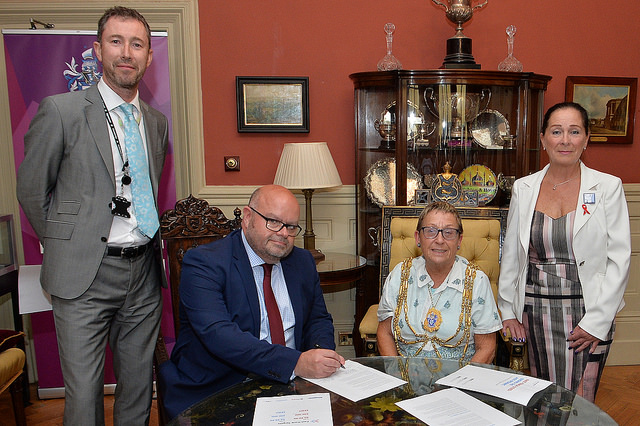Brighton and Hove has become the first city in Britain to sign up to a “fast track” commitment to try to eradicate HIV.
Brighton and Hove City Council leader Warren Morgan and the mayor of Brighton and Hove Mo Marsh formally signed the Fast Track Cities “Paris Declaration” at Brighton Town Hall yesterday (Thursday 3 August).
It commits the city – along with more than 70 other cities around the world – to try to end the public threat from HIV.
Brighton and Hove has more people living with HIV than any other British town or city outside London.
NHS records show that, in 2015, the most recent year for which figures have been published, almost 1,700 people in Brighton and Hove used HIV treatment services.
The council said: “Joining the initiative provides access to the excellent resources of the international Fast Track Cities team.
“This will help to better understand where we need to concentrate our efforts at a local level.
“While infections remain high locally, the good news is clinic data shows a significant reduction in new diagnoses over the last four years. This trend is due to a combination of improvements.
“More testing is reducing the time between infection and diagnosis, which means people are less likely to transmit the infection unknowingly.
“Also people with HIV are starting treatment earlier and are less infectious as a result.
“The proportion of HIV infection diagnosed late is 29 per cent in Brighton and Hove compared to 40 per cent in England.
“Over the last 30 years there has been incredible progress in the diagnosis and treatment of people living with HIV.
“People diagnosed early with HIV can now expect to have a near normal life expectancy.
“This is mainly thanks to improvements made in preventing transmission, prompt diagnosis and effective treatments.

“Signing the Paris Declaration shows a commitment to stop all new HIV infections and avert AIDS-related deaths.
“The declaration includes a pledge ‘to end the AIDS epidemic in cities by 2030’ and commits the city to achieving the ‘90-90-90’ targets by 2020.
“The 90-90-90 targets are
- 90 per cent of people living with HIV to be aware of their status
- 90 per cent of people who know they’re HIV positive to be on treatment and
- 90 per cent of people on treatment to have an undetectable viral load, at which point there’s a better chance of having a healthier and longer life









